What is Developmental Language Disorder?
Developmental Language Disorder (DLD) is a type of speech, language, and communication need (SLCN) that affects the way that children understand and/or use spoken and written language. These difficulties exist without another biomedical condition such as Autism or intellectual disability and can impact on education and/or social interactions.
Why is vocabulary Important?
Being able to understand and use words is a vital skill that underpins a child’s ability to master language and literacy skills. It is one of the most powerful predictors of reading success (Biemiller, 2003).
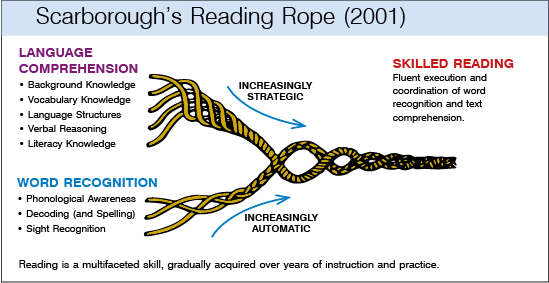
https://righttoreadproject.com/2019/06/02/part-2-complicating-the-simple-view-of-reading/
Hollis Scarborough’s Reading Rope infographic demonstrates the wide range of skills required to become a competent reader. It consists of lower and upper strands. The word-recognition strands (phonological awareness, decoding, and sight recognition of familiar words) work together as the reader becomes accurate, fluent, and increasingly automatic with repetition and practice. At the same time, the language-comprehension strands (background knowledge, vocabulary, language structures, verbal reasoning, and literacy knowledge) reinforce one another and then weave together with the word-recognition strands to produce a skilled reader. This does not happen overnight; it requires instruction and practice over time.
As typically developing children begin to read and write, they acquire more words through understanding what they are reading and then incorporate those words into their speaking and writing.
DLD & Vocabulary Acquisition
Vocabulary knowledge varies greatly among learners and pupils with language difficulties, such as those with DLD, have significant difficulties learning new vocabulary and using it in context (Gray, 2005). These children therefore know fewer words than their typically developing peers and this gap widens with age. In addition, they also often have a shallower knowledge of the words they do know (McGregor et al., 2013). It is vital that both basic everyday words and key curriculum vocabulary are explicitly and effectively taught.
Successful Vocabulary Development
We need to foster strong semantic knowledge, when teaching single words, including the way words are stored as a complex, interconnected web or ‘schema’ (a mental structure that helps us to understand how things work and relates to how we organise knowledge internally within the brain).
Children who have DLD struggle to do this on their own and require supported vocabulary learning. They will often have difficulties identifying the meaning of new words and/or remembering their form so they can produce them accurately. Studies show that pupils with DLD need more presentations of new words in order to learn them (Storkel et al., 2017, suggest 3 times as many opportunities). These children will also require regular practice with retrieving those words, spaced over several days or weeks.
Building Schema
Pupils with DLD will hear a word but will have difficulties making the necessary connections to understand and use it successfully.
Take the word ‘cycle’ for example. Each pupil will have a different idea of what ‘cycle’ means to them.
- The cycle they ride
- I can cycle to school
- The bike they fell off when cycling
- The Penny Farthing cycle
- The Olympic cyclists
- The washing machine cycle
- The life cycle
An individual’s schema for the word ‘cycle’ will be gradually built on their life experience and prior knowledge.
So, when we are teaching new vocabulary and building concept knowledge, we need to ensure that we focus not only on how pupils express and understand the meaning of words but on the relationships and organisation between words. This semantic knowledge is needed for word learning (storage) and word use (retrieval). The stronger a child’s semantic representations and links with other concepts, the easier they will find it to access a word in their everyday learning and interactions.
How can we help children with DLD to build semantic knowledge?
Any word work should be a fun activity. If we as teachers are enjoying it, then that enthusiasm for learning about words will be transferred to the pupils. Try to make the activities multi-sensory, visual, engaging, and active. Encourage all the pupils in your class to be word conscious, enjoy words, play with words, and celebrate words!
12 Practical ideas for learning vocabulary
- Think about what the word is but also ‘what it is not’. E.g., for ‘metal’, encourage the children to sort objects into groups that are ‘metal’ and ‘not metal’
- Categorise words (use objects, then pictures) e.g., transport, animals, fruit, clothes
- Explore the differences and the similarities between items within the same category e.g., dog and a giraffe, or a bicycle and a bus
- Group in subcategories e.g., clothes we wear at school, clothes we wear on the beach, clothes we wear in bed, etc
- Provide opportunities for asking questions about a word, the game HEDBANZ™ can be adapted for use with curriculum vocabulary
- Introduce a new curriculum word by relating the targeted vocabulary to the pupils’ first-hand experience e.g., protect -the case that protects the class iPad or an umbrella will protect us from getting wet
- Explore words with similar meanings to your targeted word e.g., virus (infection, disease, bug, germ etc)
- Explore word relations e.g., dustpan, dustbin, dustcart, dustman
- Think about how to use a word in a sentence (grammar/syntax). E.g., The light reflects off the mirror. Schools should reflect cultural differences. Reflect on your behaviour
- Explore multi meaning words e.g. ‘jam’, “I am in a jam.” “I spread jam on my toast”
- Focus on developing the child’s morphological awareness (ability to reflect on and manipulate morphemes in words). Give explicit examples about how words are related using suffixes and prefixes e.g., using the root word ‘do’
- Explore the target word in colloquial phrases, including idiomatic speech e.g., load – load it up, heavily loaded, a heavy load, loads of, get a load of this, load the app, a brick short of a load, had a load on
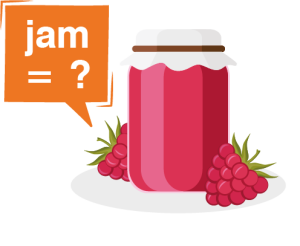

5 Best Practice Tips
Planning systematic and explicit teaching is the best way to target vocabulary development for pupils with DLD, as it will have the biggest impact on language learning and comprehension. Always set aside time for revision and practice and aim to use a combination of:
1) Vocabulary front loading
This can include:
- Brainstorming
- Bombardment – hear it, see it, say it multiple times
- Shared experiences – videos, enquiry-based learning, excursions/incursions
- Vocabulary flash cards, word maps
- Use specialist visual systems (e.g., the SHAPE CODING™ system, InPrint3, signing)
- Creating interactive Word walls/Anchor charts* related to the topic/theme/text
*An anchor chart is a tool used to support instruction i.e., “anchor” the learning for students. As you teach a lesson, you create a chart, together with your students, that captures the most important content, vocabulary, and relevant strategies.
2) Contextualised basic instruction
Introducing new words in context/relating it to first-hand experience
3) Rich instruction
Exploring what they know about the word, multiple meaning words, synonyms, and morphology
4) Repeated retrieval practice
Generalise use of targeted vocabulary in different situations and over time. Revise previously taught words, asking the children to retrieve the words. Provide feedback on how successful they were.
5) Use a word learning mat
Encourage pupils to explore everything they know about a word, including a focus on morphology and using the SHAPE CODING™ system www.shapecoding.com
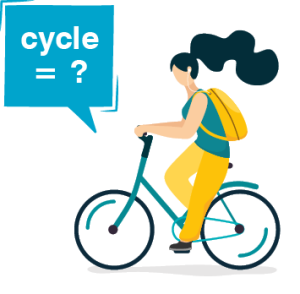
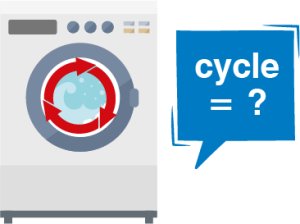
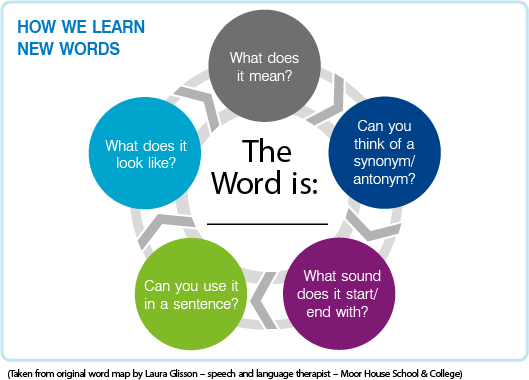
Words matter to all the pupils! Creating a language-rich classroom environment where vocabulary learning is an integral part of the day, will not only improve the learning outcomes for children and young people with language difficulties (including DLD) but for their typically developing peers too.
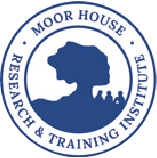
Moor House has created a series of webinars for mainstream schools, including 2 sessions about teaching vocabulary to children with DLD.
www.moorhouseschool.co.uk/dld-webinar-series
www.moorhouseinstitute.co.uk/dld-training
Twitter: @MHResTrain
Please login to view this content
Login